
can-ai-code
Self-evaluating interview for AI coders
Stars: 511
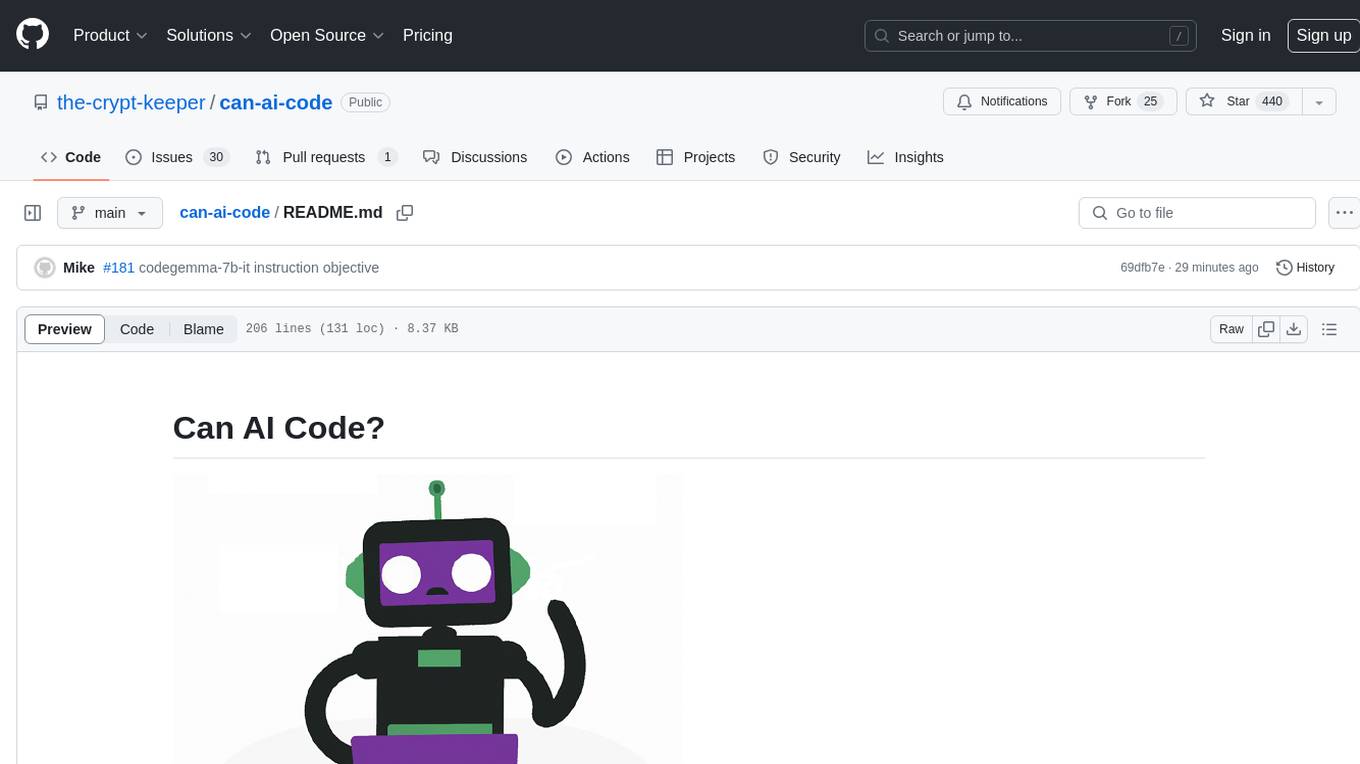
Can AI Code is a self-evaluating interview tool for AI coding models. It includes interview questions written by humans and tests taken by AI, inference scripts for common API providers and CUDA-enabled quantization runtimes, a Docker-based sandbox environment for validating untrusted Python and NodeJS code, and the ability to evaluate the impact of prompting techniques and sampling parameters on large language model (LLM) coding performance. Users can also assess LLM coding performance degradation due to quantization. The tool provides test suites for evaluating LLM coding performance, a webapp for exploring results, and comparison scripts for evaluations. It supports multiple interviewers for API and CUDA runtimes, with detailed instructions on running the tool in different environments. The repository structure includes folders for interviews, prompts, parameters, evaluation scripts, comparison scripts, and more.
README:
- Interview questions written by humans, test taken by AI
- Inference scripts for all common API providers and CUDA-enabled quantization runtimes
- Sandbox environment (Docker-based) for untrusted Python and NodeJS code validation
- Evaluate effects of prompting techniques and sampling parameters on LLM coding performance
- Evaluate LLM coding performance degradation due to quantization
9/04 Evaluate Command-R and Command-R Plus (API).
8/25 Evaluate NTQAI/Nxcode-CQ-7B-orpo (FP16), PHI 3.5 Mini and MoE (FP16), codefuse-ai/CodeFuse-StarCoder2-15B (FP16), internlm/AlchemistCoder-CL-7B (FP16), InternLM2.5 Chat 7B and 20B (FP16).
8/11 Evaluate Llama-3.1-Instruct 8B HQQ.
8/10 Evaluate Llama-3.1-Instruct 8B and 70B EXL2 and some low-bit GGUFs.
8/1 Evaluate Llama-3-Instruct 8B and 70B with AQLM-2bit. Very slow. 8B is badly damaged.
junior-v2 is a multi-language (Python, JavaScript) suite of 12 tests created for this project to test small LLM coding performance. This project provides all necessary components to execute this evaluation.
🚧 humaneval is a Python-only suite of 164 tests created by OpenAI. This project provides template scripts to prepare and execute the humaneval interview, as well as result extraction scripts to help their evaluator. See https://github.com/openai/human-eval for more information.
All model answers and evaluation results are now included inside this repository! Install a recent release of streamlit pip install streamlit==1.23 then streamlit run app.py or streamlit run compare-app.py to run the above webapps locally.
🚧 humaneval/ development work is currently paused, there's other projects that are much further along.
See https://github.com/my-other-github-account/llm-humaneval-benchmarks and https://github.com/abacaj/code-eval for large lists of Humaneval LLM benchmark results.
-
junior-v2/*.yaml- junior coder interview questions (stable) -
senior/*.yaml- senior coder interview questions (WIP)
-
prompts/*.txt- LLM prompt templates for the various models -
prepare.py- Applies templates to question turning them into language- and model-specific prompts suitable for interview
See prompts/ for all prompts references in the leaderboard.
-
params/*.json- Sampling hyper-parameter sets (used by all interview scripts) -
interview-*.py- Interview scripts
See params/ for all params references in the leaderboard.
-
evaluate.py- Run tests for the generated code in a sandbox and grades each answer -
app.py- Streamlit webapp to explore results, see https://huggingface.co/spaces/mike-ravkine/can-ai-code-results
-
compare.py- Performs comparisons between evaluations, optionally calling out to an LLM for analysis -
compare-app.py- Streamlit webapp to explore comparisons, see https://huggingface.co/spaces/mike-ravkine/can-ai-code-compare -
compare/*.yaml- Compare configurations -
compare/*.json- Compare results
| API Runtime | Script |
|---|---|
| LiteLLM (OpenAI, etc..) | interview-litellm.py |
| OobaBooga/KoboldCpp | interview-oobabooga.py |
| Huggingface Inference | interview-hfinference.py |
| Gradio (HF Spaces) | interview-gradio.py |
| Quantization Type | Script | Dependency |
|---|---|---|
| GGUF | interview-llamacpp.py |
llamacpp or ggml binary |
| GPTQ (AutoGptQ) | interview-cuda.py |
auto-gptq==0.6.0 |
| GPTQ (ExLlama) | interview-cuda.py |
exllama @ 3b013cd53c7d413cf99ca04c7c28dd5c95117c0d |
| EXL2, GPTQ (ExLlama2) | interview-cuda.py |
exllamav2 @ 0.0.12 |
| HQQ | interview-cuda.py |
hqq @ 0.1.1 |
| AWQ, FP16 (vLLM) | interview-cuda.py |
vllm==0.3.0 |
| CTranslate2 | interview-cuda.py |
ctranslate2>=3.16.0 |
| bitsandbytes | interview-cuda.py |
bitsandbytes==0.41.3 |
| FP16 (Transformers) | interview-cuda.py |
transformers==4.37.2 |
The recommended modal wrapper is interview_modal_cuda11.py which builds a CUDA11.8 based container with all the above dependencies working. An interview_modal_cuda12.py is also provided, but AutoGPTQ and CTranslate2 are not compatible.
Unfortunately the nature of Modal does not allow command-line selection of eitehr LLM model or runtime engine.
To select models, open the script and uncomment the .run_function(download...) line of choice. Note that only one model can be selected at a time. To add a new model, implement a new download... function.
To select runtime, open the script and uncomment one of the RUNTIME options. Note that for transformers you must also specify QUANT.
A set of interview questions is a folder of .yaml files. Each Question is a top-level key:
SanityList:
Signature: "things()"
Input: "with no inputs"
Output: "a list with three values: the number 5, the string 'foobar', the capital city of Spain"
Fact: "the capital city of Spain is Madrid"
Description: "List function, see if the model can combine input facts with internal knowledge."
Checks:
input_name:
assert: "f.name"
eq: "things"In this example SanityList is the name of the interview question.
The first four fields are used by prepare.py to create the interview:
-
Signatureis the desired function signature -
Inputdescribes the function inputs -
Outputdescribes the function outputs -
Factis optional and provides any context that is required to correctly perform the task
These 4 variables along with language (either python or javascript) are used to expand templates in prompts/.
The last two fields are used by evaluate.py to judge the results:
-
Descriptionis a human-readable explanation of why this test is useful -
Checksdefines the expected behavior of the output.
Each check has a name, some assert value (python code) and an expected eq value.
The f object represents the sandbox view of the function. Static analysis is performed on the function signature to extract the f.name and f.args fields, while f.call allows for function evaluation.
All scripts output automatically named .ndjson files to the results/ directory.
Each stage outputs a super-set of fields from the stage before it, so its possible to feed eval/interview back to interview (to re-run the questions) or back to eval (to re-run the eval).
results/prepare_{interview}_{languages}_{template}.ndjson
Fields:
- all Question fields (Signature, Input, Output, Fact, Description)
- name
- language
- prompt
results/interview_{interview}_{languages}_{template}_{templateout}_{params}_{model}_{timestamp}.ndjson
Fields:
- all
preparefields - model
- params
- answer
- runtime
results/eval_{interview}_{languages}_{template}_{templateout}_{params}_{model}_{timestamp}.ndjson
Fields:
- all
evalfields - status
- passed
- total
- checks
For Tasks:
Click tags to check more tools for each tasksFor Jobs:
Alternative AI tools for can-ai-code
Similar Open Source Tools

can-ai-code
Can AI Code is a self-evaluating interview tool for AI coding models. It includes interview questions written by humans and tests taken by AI, inference scripts for common API providers and CUDA-enabled quantization runtimes, a Docker-based sandbox environment for validating untrusted Python and NodeJS code, and the ability to evaluate the impact of prompting techniques and sampling parameters on large language model (LLM) coding performance. Users can also assess LLM coding performance degradation due to quantization. The tool provides test suites for evaluating LLM coding performance, a webapp for exploring results, and comparison scripts for evaluations. It supports multiple interviewers for API and CUDA runtimes, with detailed instructions on running the tool in different environments. The repository structure includes folders for interviews, prompts, parameters, evaluation scripts, comparison scripts, and more.
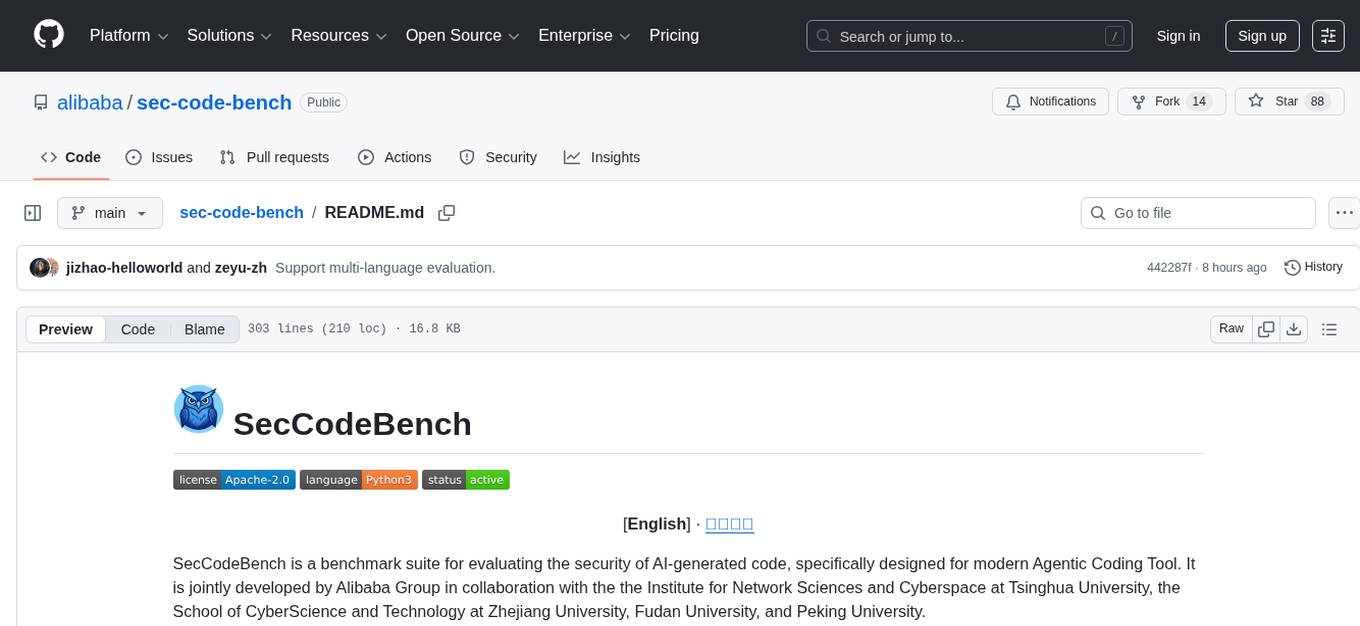
sec-code-bench
SecCodeBench is a benchmark suite for evaluating the security of AI-generated code, specifically designed for modern Agentic Coding Tools. It addresses challenges in existing security benchmarks by ensuring test case quality, employing precise evaluation methods, and covering Agentic Coding Tools. The suite includes 98 test cases across 5 programming languages, focusing on functionality-first evaluation and dynamic execution-based validation. It offers a highly extensible testing framework for end-to-end automated evaluation of agentic coding tools, generating comprehensive reports and logs for analysis and improvement.
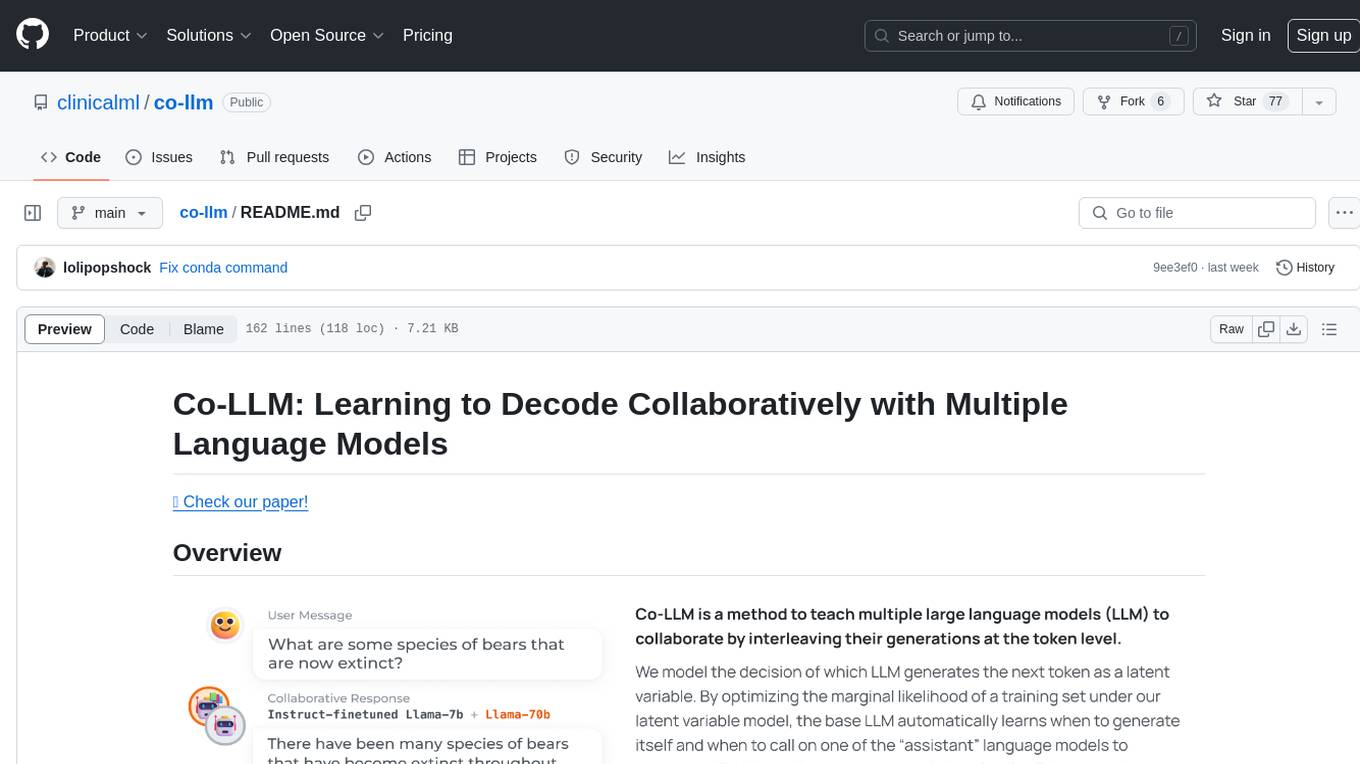
co-llm
Co-LLM (Collaborative Language Models) is a tool for learning to decode collaboratively with multiple language models. It provides a method for data processing, training, and inference using a collaborative approach. The tool involves steps such as formatting/tokenization, scoring logits, initializing Z vector, deferral training, and generating results using multiple models. Co-LLM supports training with different collaboration pairs and provides baseline training scripts for various models. In inference, it uses 'vllm' services to orchestrate models and generate results through API-like services. The tool is inspired by allenai/open-instruct and aims to improve decoding performance through collaborative learning.
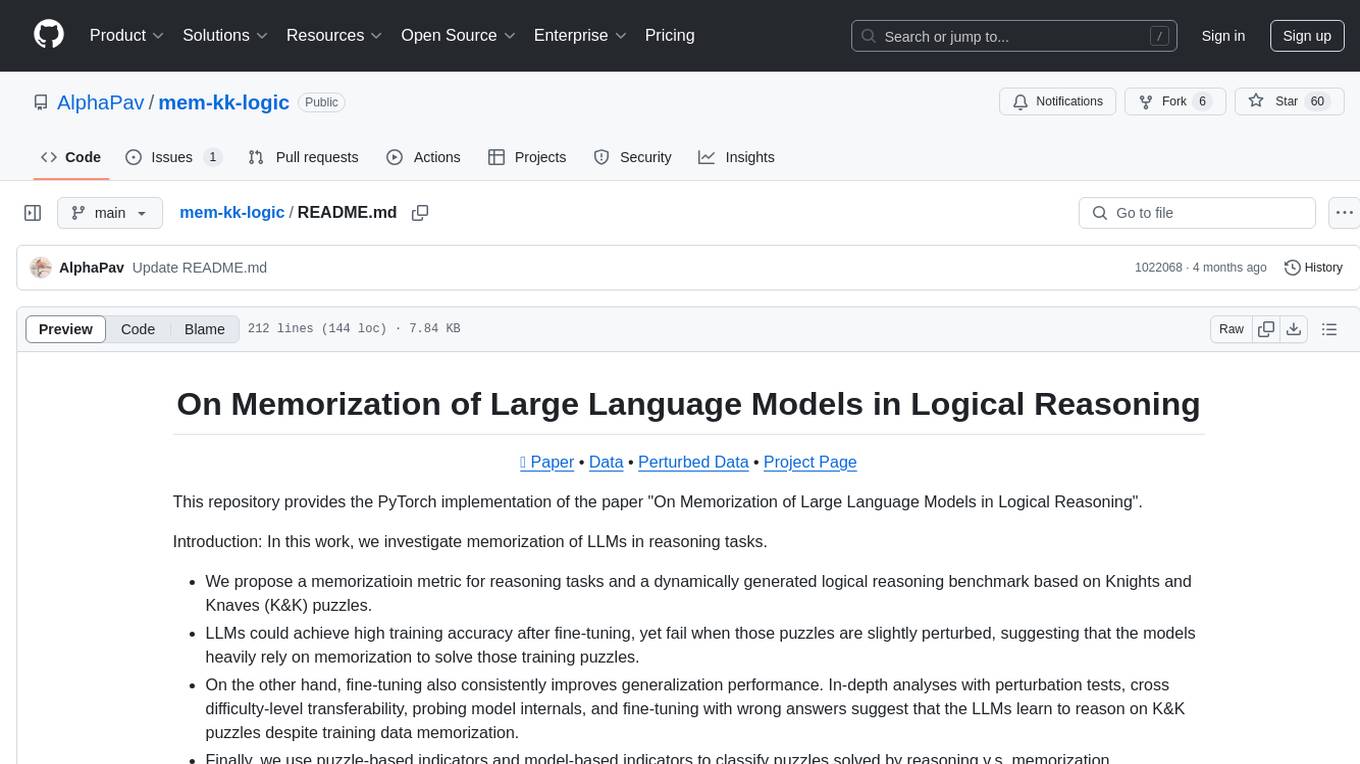
mem-kk-logic
This repository provides a PyTorch implementation of the paper 'On Memorization of Large Language Models in Logical Reasoning'. The work investigates memorization of Large Language Models (LLMs) in reasoning tasks, proposing a memorization metric and a logical reasoning benchmark based on Knights and Knaves puzzles. It shows that LLMs heavily rely on memorization to solve training puzzles but also improve generalization performance through fine-tuning. The repository includes code, data, and tools for evaluation, fine-tuning, probing model internals, and sample classification.
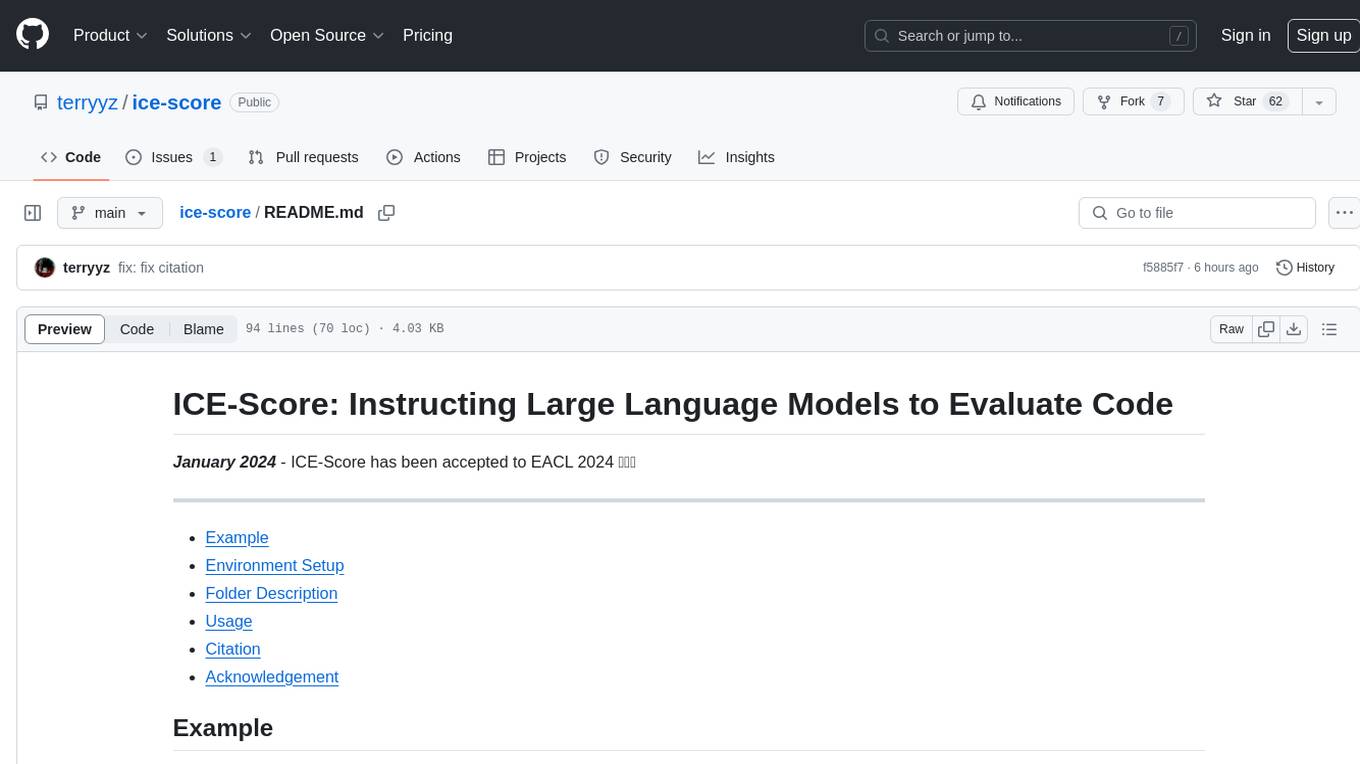
ice-score
ICE-Score is a tool designed to instruct large language models to evaluate code. It provides a minimum viable product (MVP) for evaluating generated code snippets using inputs such as problem, output, task, aspect, and model. Users can also evaluate with reference code and enable zero-shot chain-of-thought evaluation. The tool is built on codegen-metrics and code-bert-score repositories and includes datasets like CoNaLa and HumanEval. ICE-Score has been accepted to EACL 2024.
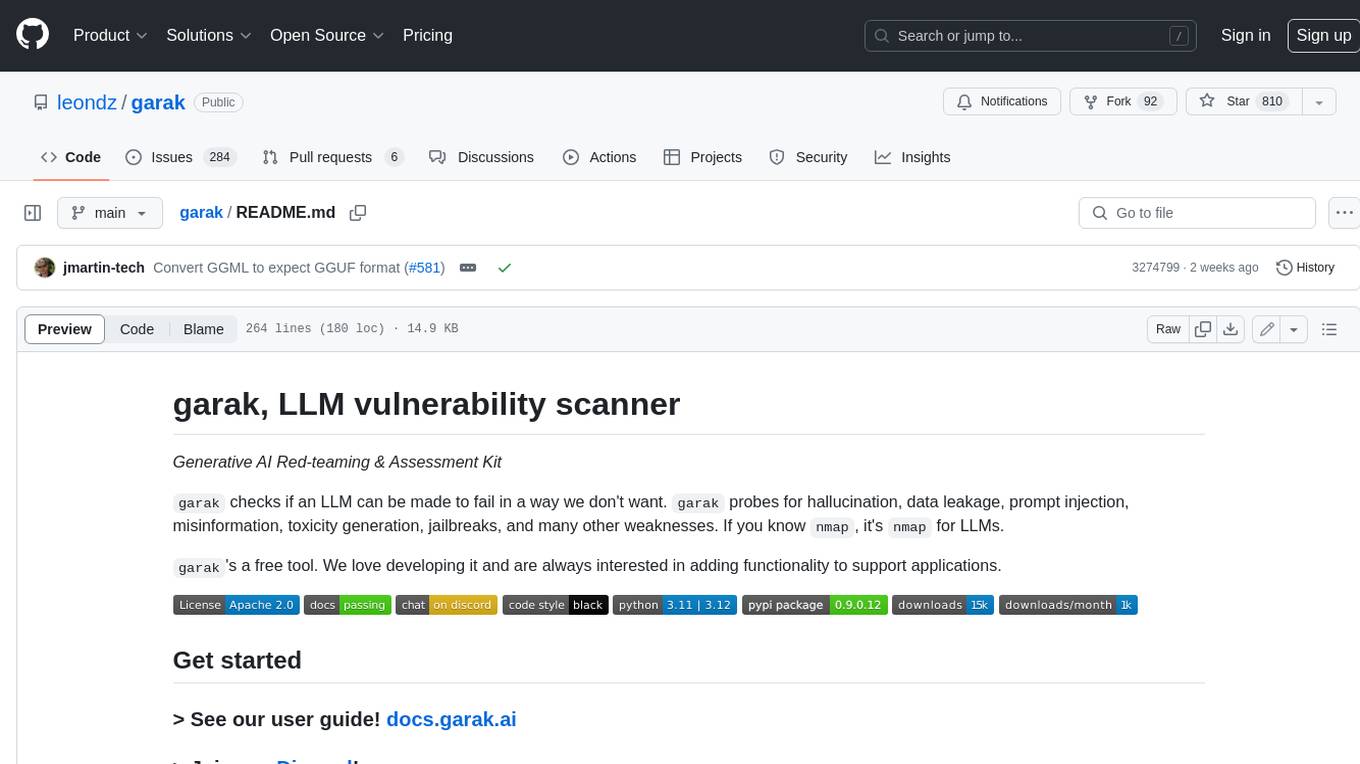
garak
Garak is a free tool that checks if a Large Language Model (LLM) can be made to fail in a way that is undesirable. It probes for hallucination, data leakage, prompt injection, misinformation, toxicity generation, jailbreaks, and many other weaknesses. Garak's a free tool. We love developing it and are always interested in adding functionality to support applications.
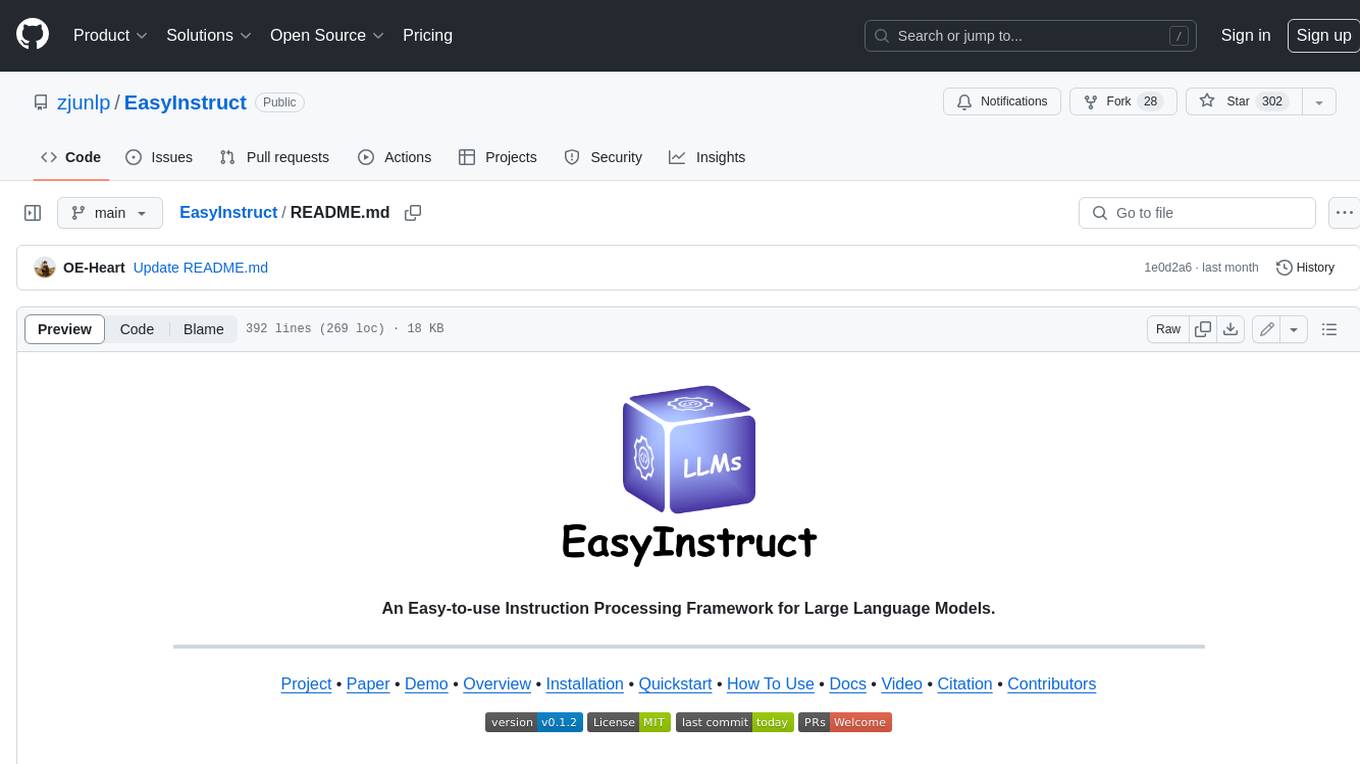
EasyInstruct
EasyInstruct is a Python package proposed as an easy-to-use instruction processing framework for Large Language Models (LLMs) like GPT-4, LLaMA, ChatGLM in your research experiments. EasyInstruct modularizes instruction generation, selection, and prompting, while also considering their combination and interaction.
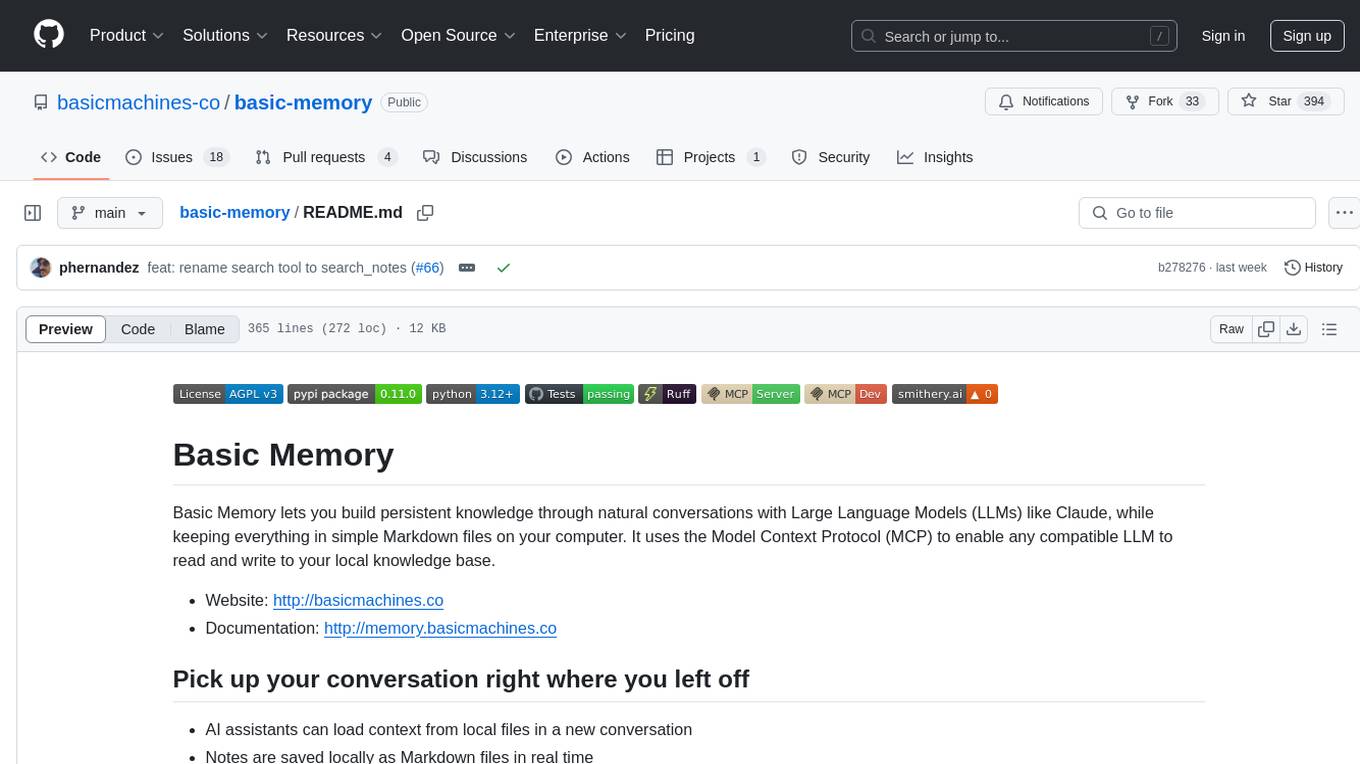
basic-memory
Basic Memory is a tool that enables users to build persistent knowledge through natural conversations with Large Language Models (LLMs) like Claude. It uses the Model Context Protocol (MCP) to allow compatible LLMs to read and write to a local knowledge base stored in simple Markdown files on the user's computer. The tool facilitates creating structured notes during conversations, maintaining a semantic knowledge graph, and keeping all data local and under user control. Basic Memory aims to address the limitations of ephemeral LLM interactions by providing a structured, bi-directional, and locally stored knowledge management solution.

hound
Hound is a security audit automation pipeline for AI-assisted code review that mirrors how expert auditors think, learn, and collaborate. It features graph-driven analysis, sessionized audits, provider-agnostic models, belief system and hypotheses, precise code grounding, and adaptive planning. The system employs a senior/junior auditor pattern where the Scout actively navigates the codebase and annotates knowledge graphs while the Strategist handles high-level planning and vulnerability analysis. Hound is optimized for small-to-medium sized projects like smart contract applications and is language-agnostic.

Trace
Trace is a new AutoDiff-like tool for training AI systems end-to-end with general feedback. It generalizes the back-propagation algorithm by capturing and propagating an AI system's execution trace. Implemented as a PyTorch-like Python library, users can write Python code directly and use Trace primitives to optimize certain parts, similar to training neural networks.
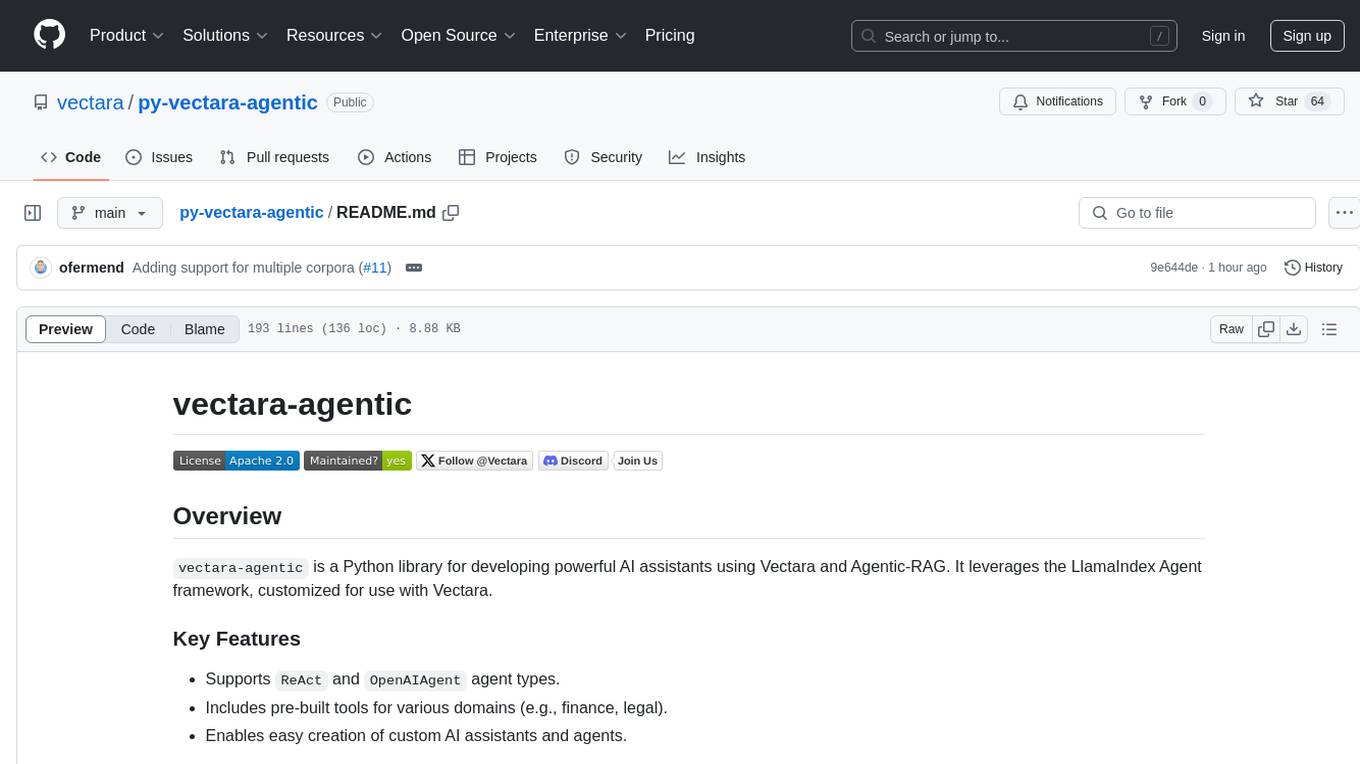
py-vectara-agentic
The `vectara-agentic` Python library is designed for developing powerful AI assistants using Vectara and Agentic-RAG. It supports various agent types, includes pre-built tools for domains like finance and legal, and enables easy creation of custom AI assistants and agents. The library provides tools for summarizing text, rephrasing text, legal tasks like summarizing legal text and critiquing as a judge, financial tasks like analyzing balance sheets and income statements, and database tools for inspecting and querying databases. It also supports observability via LlamaIndex and Arize Phoenix integration.
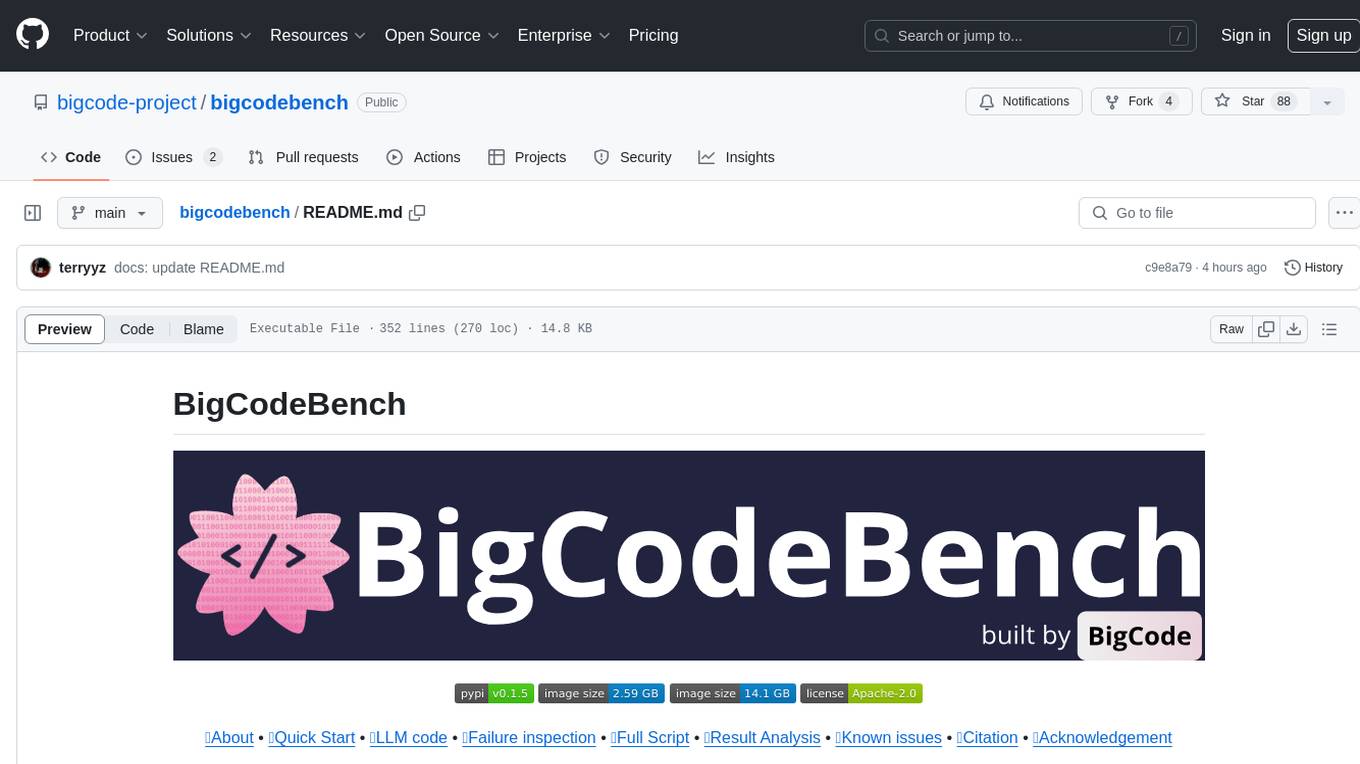
bigcodebench
BigCodeBench is an easy-to-use benchmark for code generation with practical and challenging programming tasks. It aims to evaluate the true programming capabilities of large language models (LLMs) in a more realistic setting. The benchmark is designed for HumanEval-like function-level code generation tasks, but with much more complex instructions and diverse function calls. BigCodeBench focuses on the evaluation of LLM4Code with diverse function calls and complex instructions, providing precise evaluation & ranking and pre-generated samples to accelerate code intelligence research. It inherits the design of the EvalPlus framework but differs in terms of execution environment and test evaluation.
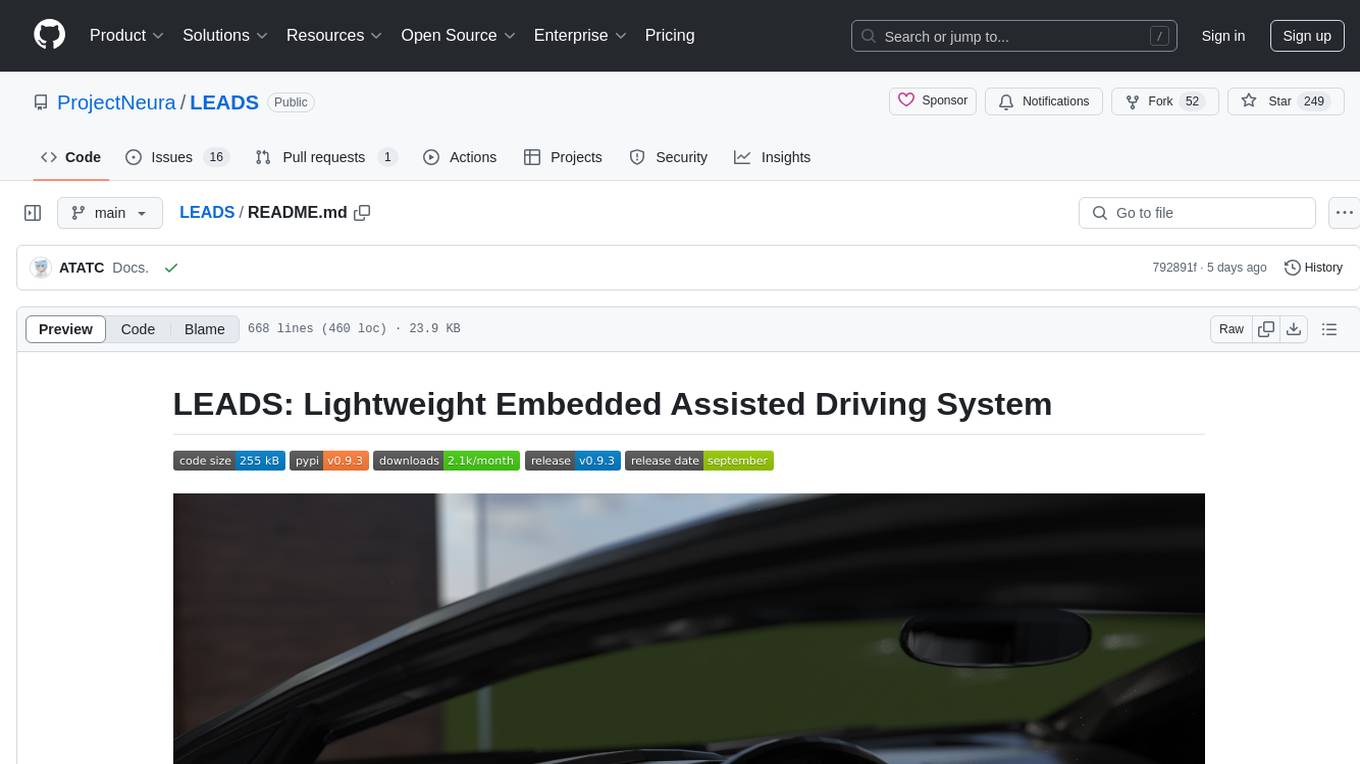
LEADS
LEADS is a lightweight embedded assisted driving system designed to simplify the development of instrumentation, control, and analysis systems for racing cars. It is written in Python and C/C++ with impressive performance. The system is customizable and provides abstract layers for component rearrangement. It supports hardware components like Raspberry Pi and Arduino, and can adapt to various hardware types. LEADS offers a modular structure with a focus on flexibility and lightweight design. It includes robust safety features, modern GUI design with dark mode support, high performance on different platforms, and powerful ESC systems for traction control and braking. The system also supports real-time data sharing, live video streaming, and AI-enhanced data analysis for driver training. LEADS VeC Remote Analyst enables transparency between the driver and pit crew, allowing real-time data sharing and analysis. The system is designed to be user-friendly, adaptable, and efficient for racing car development.
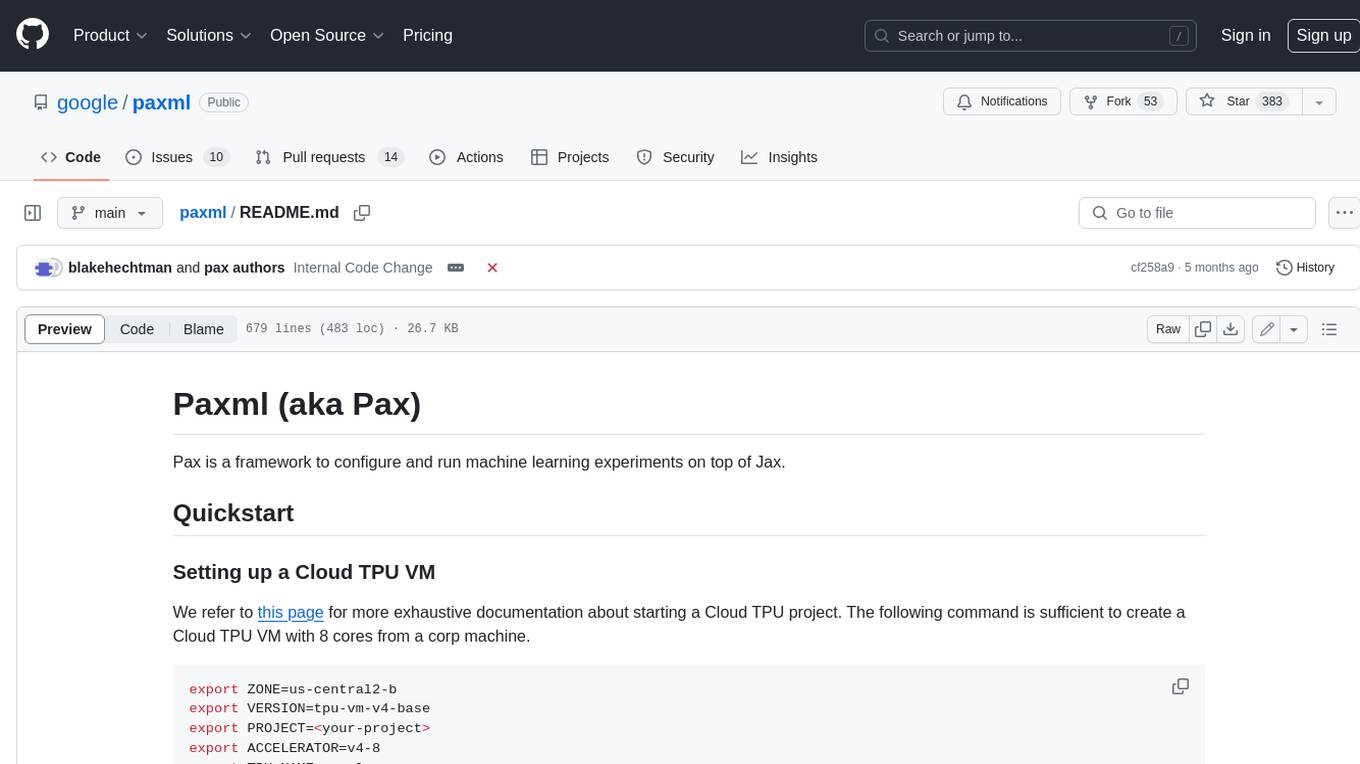
paxml
Pax is a framework to configure and run machine learning experiments on top of Jax.

code2prompt
Code2Prompt is a powerful command-line tool that generates comprehensive prompts from codebases, designed to streamline interactions between developers and Large Language Models (LLMs) for code analysis, documentation, and improvement tasks. It bridges the gap between codebases and LLMs by converting projects into AI-friendly prompts, enabling users to leverage AI for various software development tasks. The tool offers features like holistic codebase representation, intelligent source tree generation, customizable prompt templates, smart token management, Gitignore integration, flexible file handling, clipboard-ready output, multiple output options, and enhanced code readability.
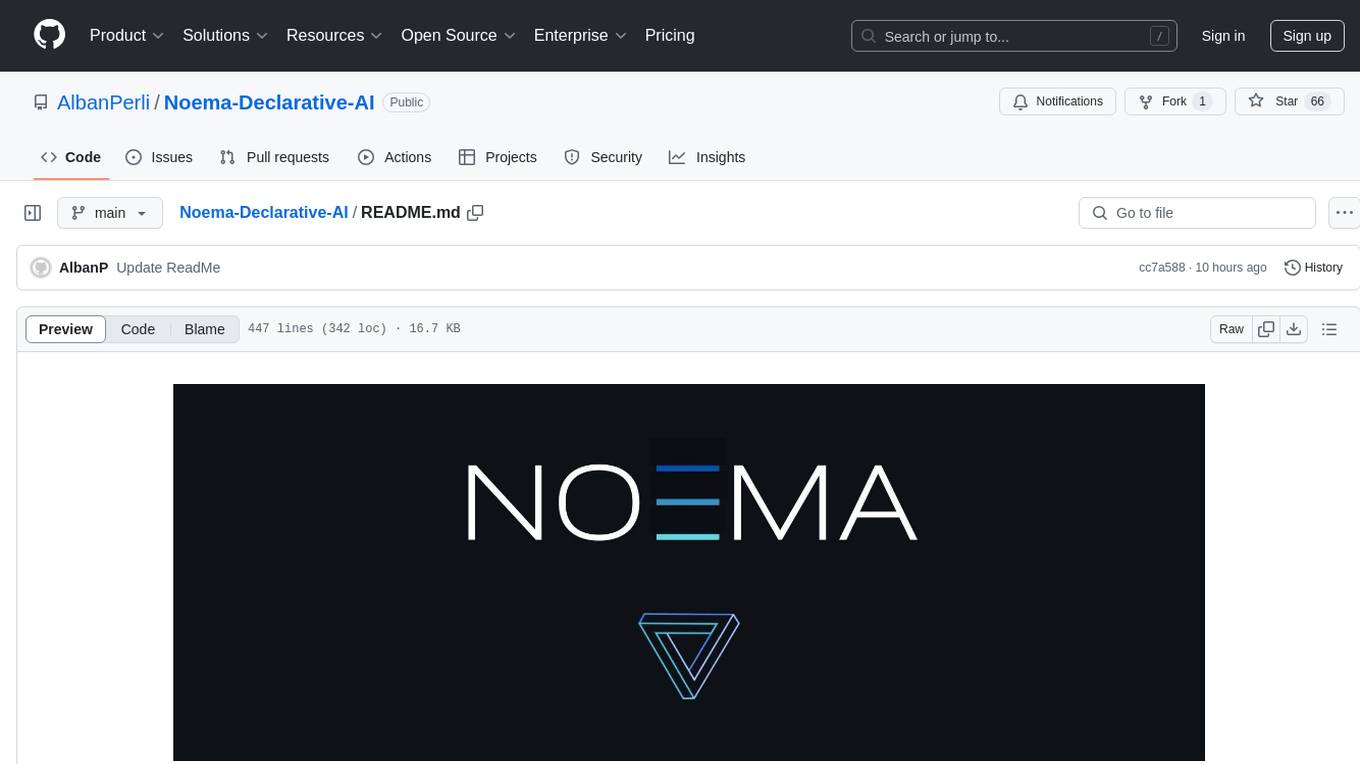
Noema-Declarative-AI
Noema is a framework that enables developers to control a language model and choose the path it will follow. It integrates Python with llm's generations, allowing users to use LLM as a thought interpreter rather than a source of truth. Noema is built on llama.cpp and guidance's shoulders. It applies the declarative programming paradigm to a language model, providing a way to represent functions, descriptions, and transformations. Users can create subjects, think about tasks, and generate content through generators, selectors, and code generators. Noema supports ReAct prompting, visualization, and semantic Python functionalities, offering a versatile tool for automating tasks and guiding language models.
For similar tasks

can-ai-code
Can AI Code is a self-evaluating interview tool for AI coding models. It includes interview questions written by humans and tests taken by AI, inference scripts for common API providers and CUDA-enabled quantization runtimes, a Docker-based sandbox environment for validating untrusted Python and NodeJS code, and the ability to evaluate the impact of prompting techniques and sampling parameters on large language model (LLM) coding performance. Users can also assess LLM coding performance degradation due to quantization. The tool provides test suites for evaluating LLM coding performance, a webapp for exploring results, and comparison scripts for evaluations. It supports multiple interviewers for API and CUDA runtimes, with detailed instructions on running the tool in different environments. The repository structure includes folders for interviews, prompts, parameters, evaluation scripts, comparison scripts, and more.
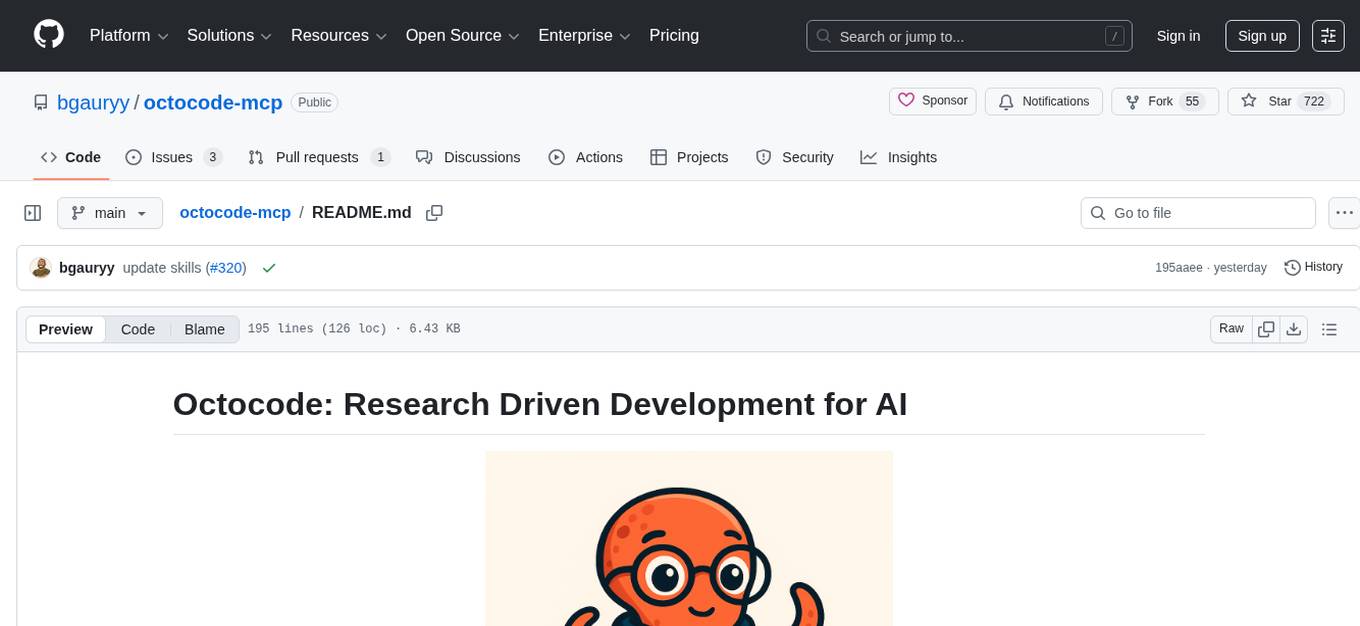
octocode-mcp
Octocode is a methodology and platform that empowers AI assistants with the skills of a Senior Staff Engineer. It transforms how AI interacts with code by moving from 'guessing' based on training data to 'knowing' based on deep, evidence-based research. The ecosystem includes the Manifest for Research Driven Development, the MCP Server for code interaction, Agent Skills for extending AI capabilities, a CLI for managing agent capabilities, and comprehensive documentation covering installation, core concepts, tutorials, and reference materials.
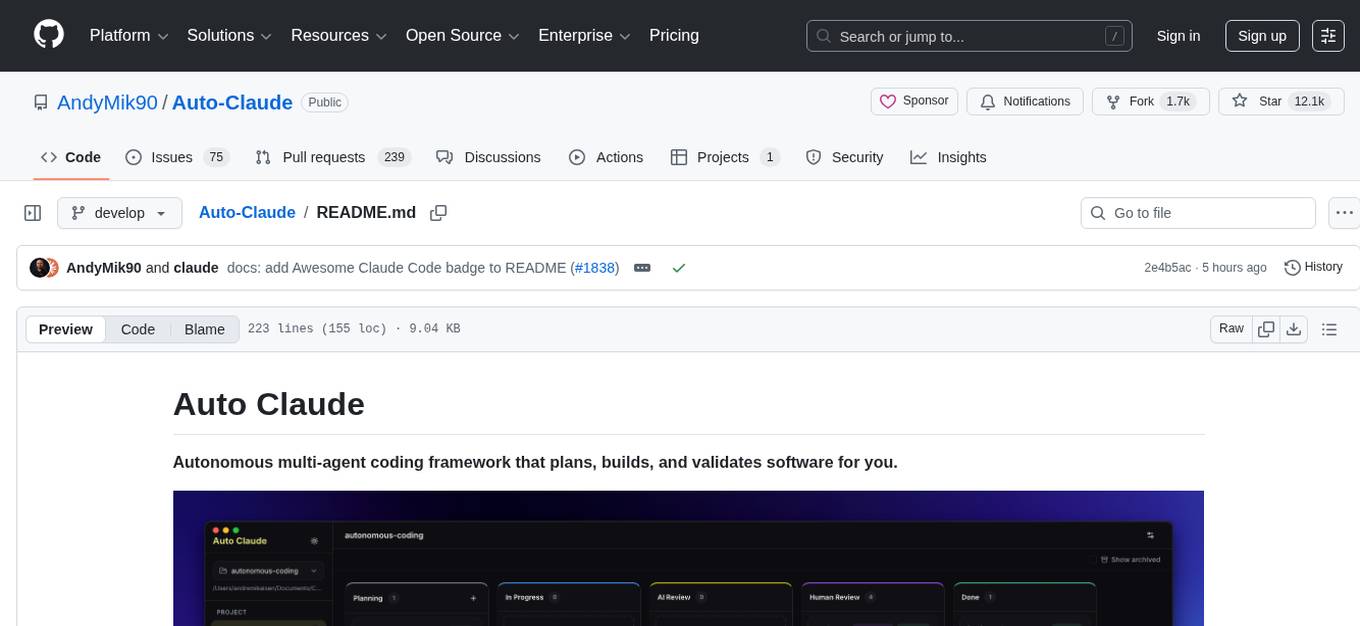
Auto-Claude
Auto Claude is an autonomous multi-agent coding framework that plans, builds, and validates software for users. It provides features such as autonomous tasks handling planning, implementation, and validation, parallel execution with multiple agent terminals, isolated workspaces for safe changes, self-validating quality assurance, AI-powered merge for conflict resolution, memory layer for smarter builds, GitHub/GitLab integration, cross-platform native desktop apps, auto-updates, and more. The tool offers a visual Kanban board for task management, AI-powered terminals for parallel work, AI-assisted feature planning, insights chat interface, ideation for code improvements, performance issues, and vulnerabilities discovery, and changelog generation from completed tasks. It follows a three-layer security model with OS sandbox, filesystem restrictions, and dynamic command allowlist, ensuring security through VirusTotal scans, SHA256 checksums, and code-signing for macOS releases.
For similar jobs

weave
Weave is a toolkit for developing Generative AI applications, built by Weights & Biases. With Weave, you can log and debug language model inputs, outputs, and traces; build rigorous, apples-to-apples evaluations for language model use cases; and organize all the information generated across the LLM workflow, from experimentation to evaluations to production. Weave aims to bring rigor, best-practices, and composability to the inherently experimental process of developing Generative AI software, without introducing cognitive overhead.

LLMStack
LLMStack is a no-code platform for building generative AI agents, workflows, and chatbots. It allows users to connect their own data, internal tools, and GPT-powered models without any coding experience. LLMStack can be deployed to the cloud or on-premise and can be accessed via HTTP API or triggered from Slack or Discord.

VisionCraft
The VisionCraft API is a free API for using over 100 different AI models. From images to sound.

kaito
Kaito is an operator that automates the AI/ML inference model deployment in a Kubernetes cluster. It manages large model files using container images, avoids tuning deployment parameters to fit GPU hardware by providing preset configurations, auto-provisions GPU nodes based on model requirements, and hosts large model images in the public Microsoft Container Registry (MCR) if the license allows. Using Kaito, the workflow of onboarding large AI inference models in Kubernetes is largely simplified.

PyRIT
PyRIT is an open access automation framework designed to empower security professionals and ML engineers to red team foundation models and their applications. It automates AI Red Teaming tasks to allow operators to focus on more complicated and time-consuming tasks and can also identify security harms such as misuse (e.g., malware generation, jailbreaking), and privacy harms (e.g., identity theft). The goal is to allow researchers to have a baseline of how well their model and entire inference pipeline is doing against different harm categories and to be able to compare that baseline to future iterations of their model. This allows them to have empirical data on how well their model is doing today, and detect any degradation of performance based on future improvements.

tabby
Tabby is a self-hosted AI coding assistant, offering an open-source and on-premises alternative to GitHub Copilot. It boasts several key features: * Self-contained, with no need for a DBMS or cloud service. * OpenAPI interface, easy to integrate with existing infrastructure (e.g Cloud IDE). * Supports consumer-grade GPUs.

spear
SPEAR (Simulator for Photorealistic Embodied AI Research) is a powerful tool for training embodied agents. It features 300 unique virtual indoor environments with 2,566 unique rooms and 17,234 unique objects that can be manipulated individually. Each environment is designed by a professional artist and features detailed geometry, photorealistic materials, and a unique floor plan and object layout. SPEAR is implemented as Unreal Engine assets and provides an OpenAI Gym interface for interacting with the environments via Python.

Magick
Magick is a groundbreaking visual AIDE (Artificial Intelligence Development Environment) for no-code data pipelines and multimodal agents. Magick can connect to other services and comes with nodes and templates well-suited for intelligent agents, chatbots, complex reasoning systems and realistic characters.
